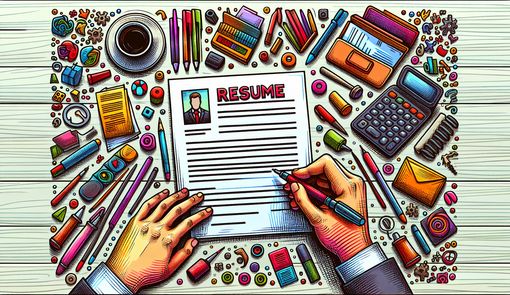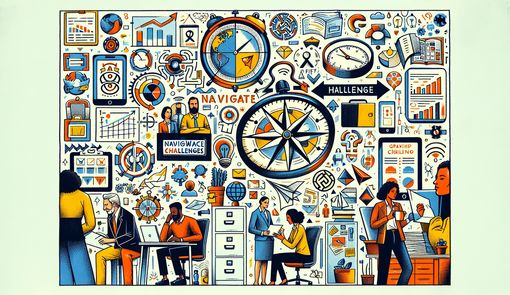How to Prepare for an Interview When You're Switching Careers
Learn effective strategies for interview preparation as you navigate the exciting challenge of a career change.

Switching careers can be both an exhilarating and daunting endeavor. Arguably, one of the most critical stages of this process is the job interview. Interviews are your opportunity to bridge the gap between your past experiences and the new role you seek. Preparation for these interviews requires a unique approach, as you must not only express your enthusiasm for the new field but also prove your worthiness despite a potentially untraditional background. Here's how to strategically prepare for an interview when transitioning into a new career.
Understand the New Industry
Begin by immersing yourself in your chosen field. Research industry trends, understand the key challenges and identify the most sought-after skills. Utilize resources such as industry journals, trade shows, online forums, and professional networking groups to deepen your knowledge. Stay up-to-date with any advancements or changes in the field — showing that you're well-informed will demonstrate your serious commitment.
Assess and Transfer Your Skills
Reflect on your current skill set and evaluate how those competencies could benefit your new career. Articulate how your transferable skills — such as leadership, problem-solving, communication and project management — apply to your desired position. Prepare concrete examples that showcase how you have successfully utilized these skills in different scenarios.
Revised Resume and Cover Letter
Your resume and cover letter may need a transformative touch when you're shifting fields. Focus on accomplishments and experiences highlighting transferable skills. Quantify your achievements where possible to demonstrate impact. Tailor your cover letter to explain your career transition, addressing potential concerns about your background while emphasizing your passion and readiness for the new industry.
Prepare for Behavioral Questions
Interviewers often rely on behavioral questions to understand how candidates have handled situations in the past. Prepare for these by using the STAR method (Situation, Task, Action, Result) to structure your responses. Practice articulating your past experiences in a way that shows your potential to succeed in new and unfamiliar situations.
Know Your Value Proposition
Identify what unique perspectives or experiences you bring to the table that other candidates might not. Highlighting these during your interview can distinguish you from the competition. Maybe you have cross-industry knowledge, a unique problem-solving method or an innovation-minded approach. Be ready to discuss these qualities and how they will benefit the employer.
Research the Company
Show that you have taken the time to understand the company you're applying to. Highlight how your background and skill set align with the company's values, culture, and goals. Researching the company thoroughly will help you answer questions like, "Why do you want to work with us?" convincingly.
Engage with Your Network
Networking is key in a career change. Reach out to contacts in the industry for informational interviews, advice, and introductions. They may provide you with insight into the company culture or refer you directly to hiring managers. These connections can also offer a more nuanced understanding of what is expected from candidates.
Conduct Mock Interviews
Practice makes perfect. Arrange mock interviews with friends or mentors who can provide objective feedback. If possible, choose individuals who are familiar with the industry or hire a career coach with experience in career transitions. They can provide valuable insights into your interviewing style and advice on areas for improvement.
Show Enthusiasm and Flexibility
Your passion for the new career must be evident. While you may lack specific industry experience, a willingness to learn and adapt is highly attractive to employers. Express your enthusiasm for the industry and the role. Be open about your desire to grow and take on challenges.
Expect and Prepare for Concerns
Employers may have reservations about hiring someone without direct experience. Anticipate these concerns and prepare rebuttals. Provide evidence of how quickly you've adapted to new environments in the past, focus on your ability to learn rapidly and emphasize the fresh perspective you bring.
Prepare Thoughtful Questions
Asking insightful questions can leave a lasting impression. Prepare questions that demonstrate your deep understanding of the new industry, the company and the potential challenges you might face. It's also a chance to assess if the company's environment is suitable for your own career growth.
Conclusion
Transitioning into a new career is not without its challenges, but with proper interview preparation, you can present yourself as a compelling candidate. Embrace the process of learning, showcase your adaptable skill set, and foreground the unique value you offer. By applying these tailored strategies, you will position yourself as an enthusiastic and capable candidate ready to take on new professional challenges, even in an unfamiliar industry.
Frequently Asked Questions
Q: How can I prepare for an interview when switching careers?
A: When preparing for an interview while transitioning into a new career, it's essential to first understand the new industry you're entering. Research industry trends, assess and transfer your skills, revise your resume and cover letter to highlight transferable skills, prepare for behavioral questions using the STAR method, know your unique value proposition, research the company you're applying to, engage with your network, conduct mock interviews, show enthusiasm and flexibility, expect and prepare for concerns, and prepare thoughtful questions.
Q: What is the STAR method for preparing for behavioral questions?
A: The STAR method (Situation, Task, Action, Result) is a structured approach to answering behavioral questions in interviews. You describe the Situation you were in, the Task you had to accomplish, the Actions you took to address the task, and the Results of your actions. This method helps interviewers understand how you have handled specific situations in the past and assess your potential to succeed in new roles.
Q: How can I address concerns about my lack of direct experience in the new industry?
A: Addressing concerns about lack of direct experience involves anticipating these concerns beforehand and preparing strong rebuttals. Focus on how quickly you can adapt to new environments, emphasize your ability to learn rapidly, and highlight the fresh perspective and transferable skills you bring to the role. Show your willingness to learn and grow, and express your enthusiasm for the industry and the opportunity to take on new challenges.
Q: Why is networking important when switching careers?
A: Networking is crucial when transitioning into a new career as it allows you to connect with professionals in the industry, gather insights, seek advice, and potentially access job opportunities. Networking provides you with a better understanding of the industry landscape, company cultures, and expectations from candidates. It can also lead to referrals and introductions to hiring managers, increasing your chances of landing interviews and job offers.
Q: How can I demonstrate my value during an interview despite lacking specific industry experience?
A: To demonstrate your value during an interview, focus on highlighting your transferable skills, unique perspectives, and experiences that differentiate you from other candidates. Emphasize your adaptability, willingness to learn, and passion for the new industry. Showcase how your cross-industry knowledge, problem-solving abilities, or innovative approach can benefit the employer. Be prepared to articulate these qualities confidently and connect them to the company's goals and values.
Further Resources
For additional guidance and tips on preparing for interviews during a career change, the following resources can be immensely helpful:
- The Muse - Explore articles and videos offering insights on career transitions, interview tips, and resume advice.
- LinkedIn Learning - Access courses on career development, job search strategies, and interview techniques to enhance your preparation.
- Glassdoor - Utilize company reviews, interview insights, and salary information to research your potential employers thoroughly.
- Career Pivot - Discover resources and tools focusing on career change strategies, networking, and job search tactics.
- Harvard Business Review - Read articles on leadership, management, and career advancement to stay informed and inspire growth in your new career.
- Career Change Central - Find guides, webinars, and success stories from professionals who have successfully navigated career changes.
- Monster Career Advice - Access a wide range of articles covering interview preparation, resume writing, and career transition strategies.
- Forbes Careers - Stay updated on industry trends, job market insights, and career development advice from Forbes' experts.
- The Balance Careers - Explore comprehensive guides on resume writing, interview techniques, and job search strategies tailored to different career stages.
- Career One Stop - A U.S. Department of Labor-sponsored website offering tools and resources for career exploration, training, and job search.
By utilizing these resources in conjunction with the strategies mentioned in this article, you can enhance your interview preparation and confidently navigate the challenges of switching careers. Good luck on your career change journey!

 Resume and Cover Letter Writing
Resume and Cover Letter Writing Interview Preparation
Interview Preparation Career Development
Career Development Networking and Personal Branding
Networking and Personal Branding Workplace Skills
Workplace Skills Job Search Strategies
Job Search Strategies Work-Life Balance
Work-Life Balance Salary Negotiation
Salary Negotiation Career Transitions
Career Transitions Navigating Workplace Challenges
Navigating Workplace Challenges Professional Growth
Professional Growth Trends in the Workplace
Trends in the Workplace